2024届高考英语:名词性从句的来龙去脉及底层逻辑 课件(共26张PPT)
文档属性
| 名称 | 2024届高考英语:名词性从句的来龙去脉及底层逻辑 课件(共26张PPT) |
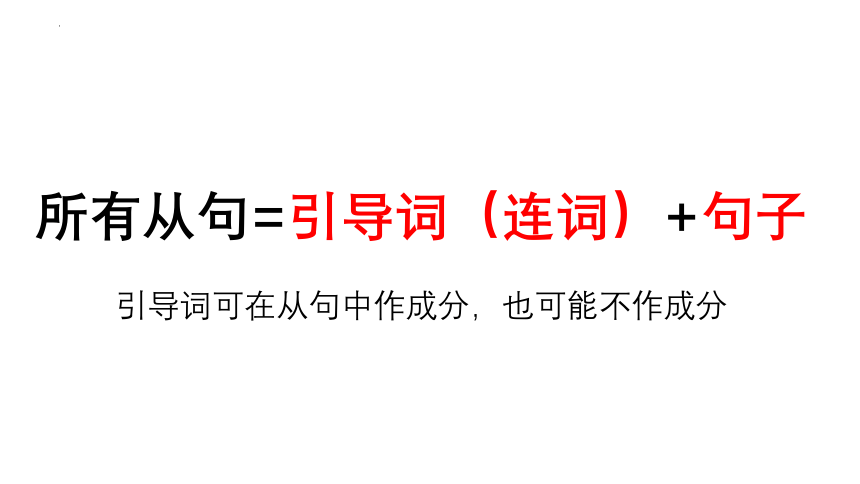
|
|
| 格式 | pptx | ||
| 文件大小 | 147.7KB | ||
| 资源类型 | 教案 | ||
| 版本资源 | 通用版 | ||
| 科目 | 英语 | ||
| 更新时间 | 2023-10-30 19:53:09 | ||
图片预览

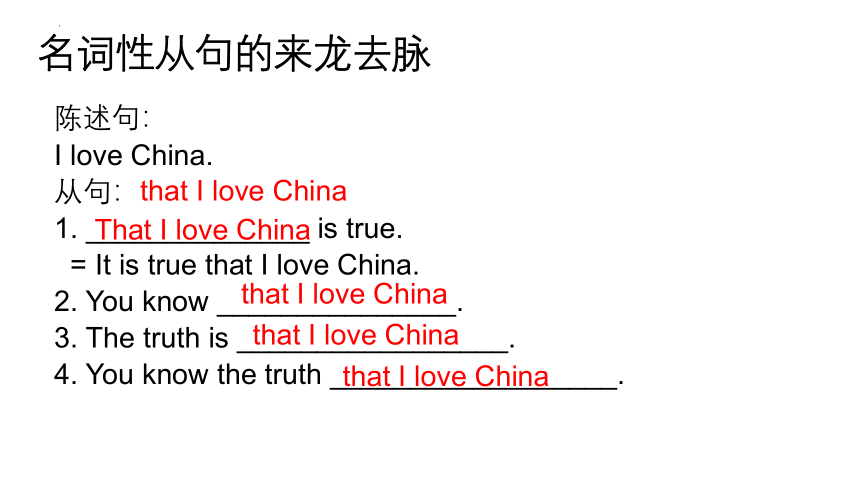
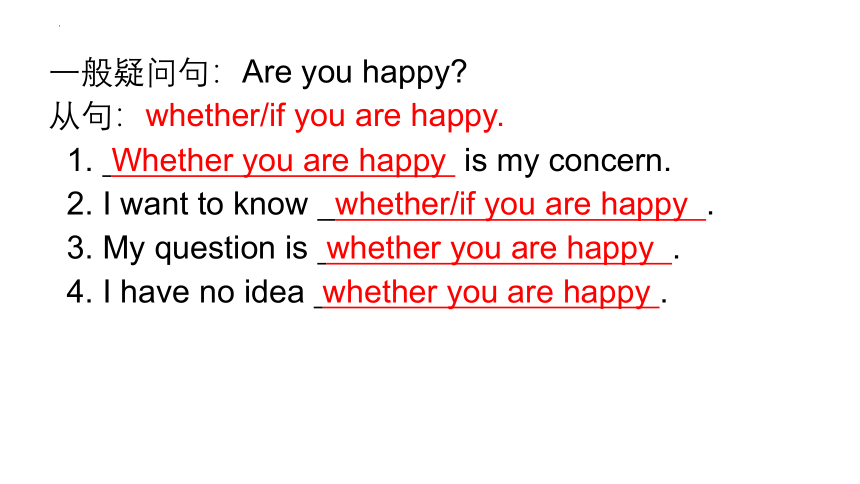
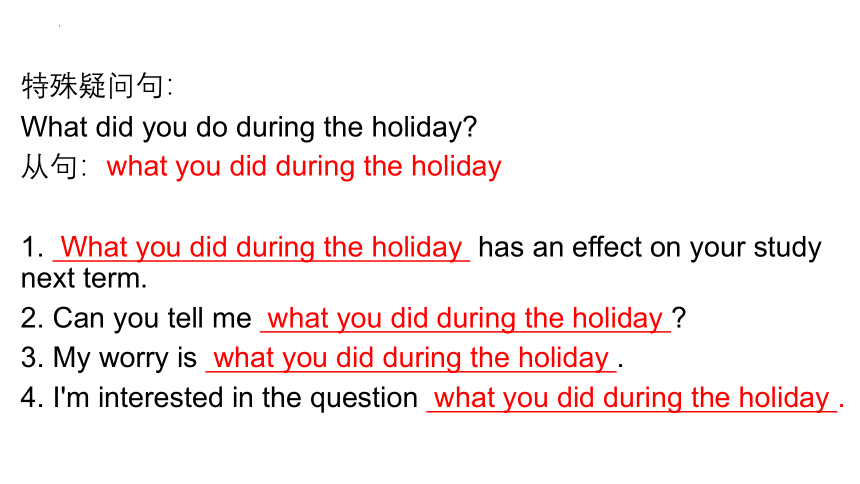
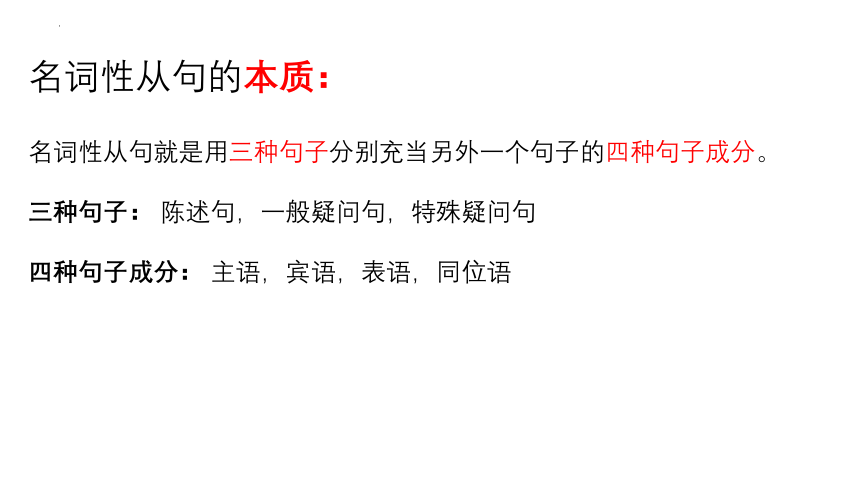
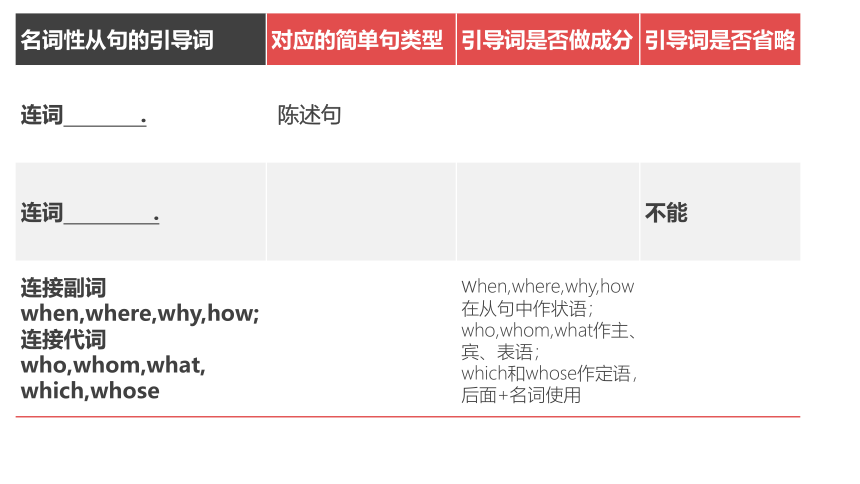
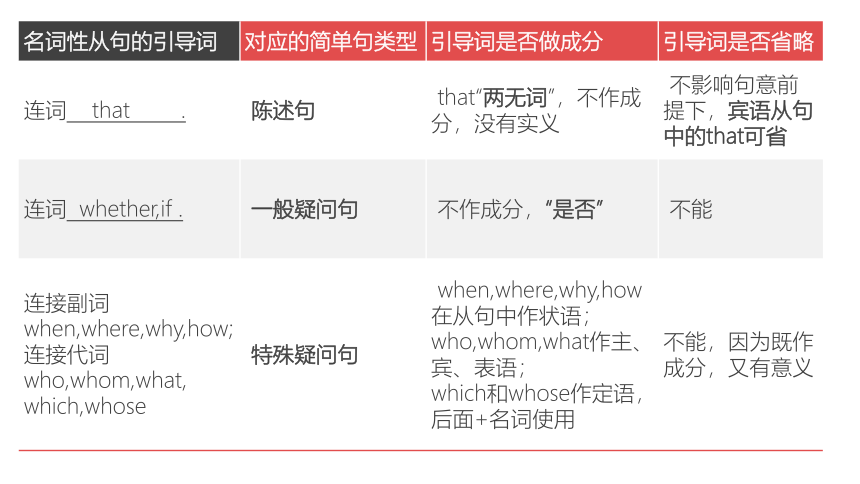
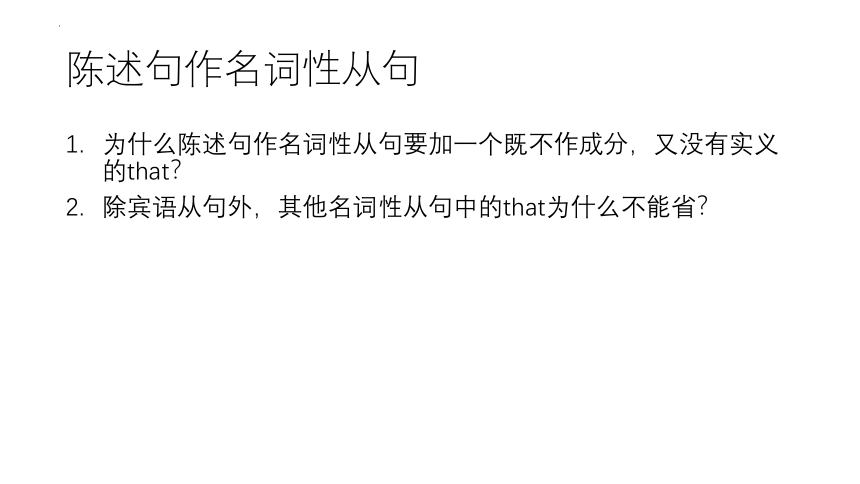
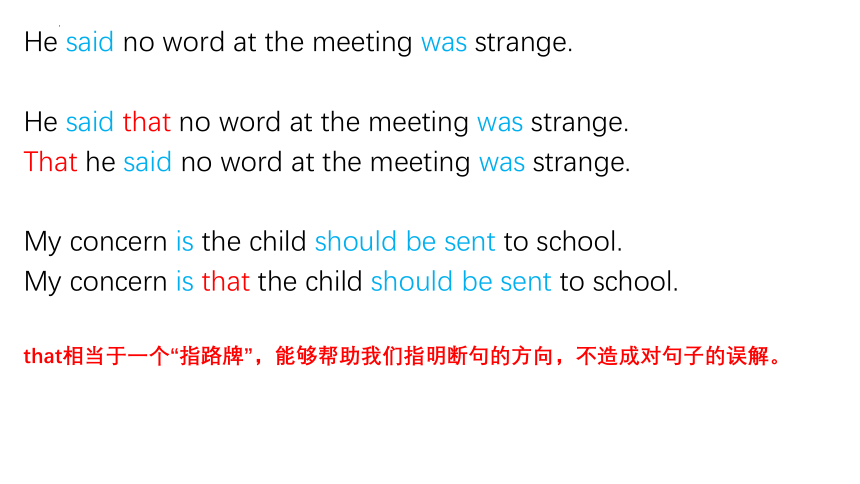
文档简介
(共26张PPT)
所有从句=引导词(连词)+句子
引导词可在从句中作成分,也可能不作成分
名词性从句的来龙去脉
陈述句:
I love China.
从句:that I love China
1. ______________ is true.
= It is true that I love China.
2. You know _______________.
3. The truth is _________________.
4. You know the truth __________________.
That I love China
that I love China
that I love China
that I love China
一般疑问句:Are you happy
从句:whether/if you are happy.
1. Whether you are happy is my concern.
2. I want to know whether/if you are happy .
3. My question is whether you are happy .
4. I have no idea whether you are happy .
特殊疑问句:
What did you do during the holiday
从句:what you did during the holiday
1. What you did during the holiday has an effect on your study next term.
2. Can you tell me what you did during the holiday
3. My worry is what you did during the holiday .
4. I'm interested in the question what you did during the holiday .
名词性从句的本质:
名词性从句就是用三种句子分别充当另外一个句子的四种句子成分。
三种句子: 陈述句,一般疑问句,特殊疑问句
四种句子成分: 主语,宾语,表语,同位语
名词性从句的引导词 对应的简单句类型 引导词是否做成分 引导词是否省略
连词 . 陈述句
连词 . 不能
连接副词when,where,why,how;连接代词who,whom,what, which,whose when,where,why,how在从句中作状语; who,whom,what作主、宾、表语; which和whose作定语,后面+名词使用
名词性从句的引导词 对应的简单句类型 引导词是否做成分 引导词是否省略
连词 that . 陈述句 that“两无词”,不作成分,没有实义 不影响句意前提下,宾语从句中的that可省
连词 whether,if . 一般疑问句 不作成分,“是否” 不能
连接副词when,where,why,how; 连接代词 who,whom,what, which,whose 特殊疑问句 when,where,why,how在从句中作状语; who,whom,what作主、宾、表语; which和whose作定语,后面+名词使用 不能,因为既作成分,又有意义
陈述句作名词性从句
为什么陈述句作名词性从句要加一个既不作成分,又没有实义的that?
除宾语从句外,其他名词性从句中的that为什么不能省?
He said no word at the meeting was strange.
He said that no word at the meeting was strange.
That he said no word at the meeting was strange.
My concern is the child should be sent to school.
My concern is that the child should be sent to school.
that相当于一个“指路牌”,能够帮助我们指明断句的方向,不造成对句子的误解。
一般疑问句作名词性从句
if还是whether
1. if只用于动词后的宾语从句(不引导介词后的宾从),whether引导所有名词性从句;
he comes or not makes no difference.
The question is he will come.
I asked her __________ she had a bike.
2. if不和or not直接连用,即一般不说if or not, 但可以说if...or not。whether没有此限制。
I don’t know or not he comes.
3. if不和不定式 to do 连用
I don’t know to go.
I asked her __________ she had a bike.
we will hold a party in the open air tomorrow depends on the weather.
We’re worried about ________ he is safe.
The question is _________ he has finished the task.
1. 变倒装语序为陈述语序;
Why did dinosaurs become extinct It is still a mystery
Why dinosaurs became extinct is still a mystery.
2. 特殊疑问词作主语,无需调整语序
Who will chair the meeting It has not yet been decided.
Who will chair the meeting has not yet been decided.
特殊疑问句作名词性从句
主语从句
How you got me blind is still a mystery.
What you did is really important.
Whoever neglects learning in his youth loses the past and is dead for the futrue.
Whether you are happy is my concern.
That I love China is true.
1.It + be + 形容词 + that从句
It is necessary / important/ obvious/... that…
2.It + be + -ed分词 + that从句
It is believed that… 人们相信…
It is known to us all that …. 众所周知…
It has been decided that…… 已经决定……
3.It + be + 名词 + that从句
It is common knowledge that… …是常识
It is a surprise that …. 令人惊奇的是…
It is a fact that…… 事实是……
4.It + 不及物动词 + that从句
It appears that… 似乎…
It happens that …. 碰巧…
It turns out that …… 结果证明是……
主语从句句型
某人突然想起某事
It dawned upon/on sb. that...
It occurred to sb. that...
It hit/struck sb. that...
主语从句句型
主语从句的主谓一致
When the meeting will begin _____ (have) not been decided yet .
When they will start and where they will go_____(be)still unknown.
When and where the meeting will begin _____ (have) not been decided yet .
单个的主语从句作主语时,谓语动词一般用 形式。
如果是两个或两个以上的主语从句作主语,谓语动词则用 形式。
由两个或多个连接词引导一个主语从句,谓语动词用 形式。
宾语从句句型
1. 在及物动词后作宾语
I‘ve learned that love, not time, heals all wouds.
2. 在双宾动词后作直接宾语
动词+间接宾语+直接宾语(从句 )
I assure you that I had no intention of offending you.
3. 在双宾动词后作间接宾语
动词+间接宾语(从句) +直接宾语
They gave who came to the meeting a pamphlet.
4. 在介词后作宾语
I find the best way to concentrate is to make notes on what the teachers are saying.
5. 在某些形容词后作宾语
这类形容词常见的有sure, certain, glad, pleased, happy, afraid, surprised, satisfied等。
I am sure you looked beautiful that evening.
We were not surprised that he returned three days later than expected.
6. 宾语从句后置
动词+it形式宾语+宾语补足语+that宾语从句
We believe it true that the human body is also a kind of good conductor.
that在宾语从句中的省略问题
宾语从句中的that起引导作用,在句中不做任何成分,没有实际意义,通常可以将其省略。但是在以下情况中,that不能省略:
1、and连接两个宾语从句,that宾语从句放在and的后面时,that不能省略。
例: Everybody could see what happened and that Tom was frightened
They told me that they won the game and that they would be awarded.
2、that引导的宾语从句作介词宾语时,that不能省略。
例:I know nothing about him except that he is from the south
The differ from each other in that they have quite different characters.
3、that从句位于句首时,that不可省略。
例:That he ever said such a thing I simply don’t believe
4、主句谓语动词与that从句之间有插入语,that不可省略。
例:We decided, in view of his special circumstances, that we would admit him.
1. He said that he will go to the station.
2. Our physics teacher once told us that light travelled faster than sound.
3. Tom thinks that Mary is the best in their class at present and that she deserved to be awarded .
主句的动词用过去时
1. 从句谓语动词用某种过去时态
2.从句表示客观事实,格言,谚语等 ,从句谓语动词用一般现在时
主句的动词用一般现在时,从句谓语可根据需要选用各种时态,不受限制。
宾语从句中的时态
单句改错:
同位语从句句型
1. 名词+that+陈述句
I have been left with the knowledge that it’s better to expect nothing than to give everything and then be disappinted.
2. 名词+定语+that+陈述句
The statement by the driver of the vehicle that he did not see the lorry was rejected by the court.
3. 做主语的名词+谓语+that+陈述句
Evidence came up that specific speech sounds are recognized by babies as young as 6 months old.
为什么同位语从句多由that引导?
因为我们多使用陈述句来说明名词的内容。
从句的“嵌套结构”
1. 名词性从句的“嵌套结构”
I realized that what I said was not exactly what I meant to say.
The question is how what you have learned can be put into practice.
2. 连词与动词的配比原则
N个谓语,对应有N-1个连词以及N-1个对应的从句
多出的一个谓语就是主句的谓语动词。
That the seas are being overfished has been known for years. What researchers such as Ransom Myers and Boris Worm have shown is just how fast things are changing.
No one is in the least interest in the marks a little child gets on his test; what we are interested in is whether we can conclude from his mark on the test that the child will do better or worse than other children of his age at tasks which we think require “general intelligence”.
that还是what
1._____ he wants is a book.
2._____ he wants to go there is obvious.
3.The result is ______ we won the game.
4.This is _____ we want to know.
5.Is _____ he told us true
6.We should pay attention to ______ the teacher is saying.
7. I have no doubt _____ he will come.
8. I have no idea ____he did that afternoon.
9._____ has made China_____ it is now
that还是what
that :无意义,在从句中不充当任何成分, 且在宾语从句中有时可被省略。
what:有意义,“什么;所…的东西/事情/话”。 在从句中作主语、宾语、表语、定语。
that时后来添加到陈述句上的,所以当然不会充当成分;
what本来就是疑问句中的疑问词,是不可或缺的成分。
小结
一个中心:
名词性从句的本质: 名词性从句就是用三种句子分别充当另外一个句子的四种句子成分。
三种句子: 陈述句,一般疑问句,特殊疑问句
四种句子成分: 主语,宾语,表语,同位语
两个基本点:
1. 名词性从句的位置特点;
2. 各个引导词的用法区别
所有从句=引导词(连词)+句子
引导词可在从句中作成分,也可能不作成分
名词性从句的来龙去脉
陈述句:
I love China.
从句:that I love China
1. ______________ is true.
= It is true that I love China.
2. You know _______________.
3. The truth is _________________.
4. You know the truth __________________.
That I love China
that I love China
that I love China
that I love China
一般疑问句:Are you happy
从句:whether/if you are happy.
1. Whether you are happy is my concern.
2. I want to know whether/if you are happy .
3. My question is whether you are happy .
4. I have no idea whether you are happy .
特殊疑问句:
What did you do during the holiday
从句:what you did during the holiday
1. What you did during the holiday has an effect on your study next term.
2. Can you tell me what you did during the holiday
3. My worry is what you did during the holiday .
4. I'm interested in the question what you did during the holiday .
名词性从句的本质:
名词性从句就是用三种句子分别充当另外一个句子的四种句子成分。
三种句子: 陈述句,一般疑问句,特殊疑问句
四种句子成分: 主语,宾语,表语,同位语
名词性从句的引导词 对应的简单句类型 引导词是否做成分 引导词是否省略
连词 . 陈述句
连词 . 不能
连接副词when,where,why,how;连接代词who,whom,what, which,whose when,where,why,how在从句中作状语; who,whom,what作主、宾、表语; which和whose作定语,后面+名词使用
名词性从句的引导词 对应的简单句类型 引导词是否做成分 引导词是否省略
连词 that . 陈述句 that“两无词”,不作成分,没有实义 不影响句意前提下,宾语从句中的that可省
连词 whether,if . 一般疑问句 不作成分,“是否” 不能
连接副词when,where,why,how; 连接代词 who,whom,what, which,whose 特殊疑问句 when,where,why,how在从句中作状语; who,whom,what作主、宾、表语; which和whose作定语,后面+名词使用 不能,因为既作成分,又有意义
陈述句作名词性从句
为什么陈述句作名词性从句要加一个既不作成分,又没有实义的that?
除宾语从句外,其他名词性从句中的that为什么不能省?
He said no word at the meeting was strange.
He said that no word at the meeting was strange.
That he said no word at the meeting was strange.
My concern is the child should be sent to school.
My concern is that the child should be sent to school.
that相当于一个“指路牌”,能够帮助我们指明断句的方向,不造成对句子的误解。
一般疑问句作名词性从句
if还是whether
1. if只用于动词后的宾语从句(不引导介词后的宾从),whether引导所有名词性从句;
he comes or not makes no difference.
The question is he will come.
I asked her __________ she had a bike.
2. if不和or not直接连用,即一般不说if or not, 但可以说if...or not。whether没有此限制。
I don’t know or not he comes.
3. if不和不定式 to do 连用
I don’t know to go.
I asked her __________ she had a bike.
we will hold a party in the open air tomorrow depends on the weather.
We’re worried about ________ he is safe.
The question is _________ he has finished the task.
1. 变倒装语序为陈述语序;
Why did dinosaurs become extinct It is still a mystery
Why dinosaurs became extinct is still a mystery.
2. 特殊疑问词作主语,无需调整语序
Who will chair the meeting It has not yet been decided.
Who will chair the meeting has not yet been decided.
特殊疑问句作名词性从句
主语从句
How you got me blind is still a mystery.
What you did is really important.
Whoever neglects learning in his youth loses the past and is dead for the futrue.
Whether you are happy is my concern.
That I love China is true.
1.It + be + 形容词 + that从句
It is necessary / important/ obvious/... that…
2.It + be + -ed分词 + that从句
It is believed that… 人们相信…
It is known to us all that …. 众所周知…
It has been decided that…… 已经决定……
3.It + be + 名词 + that从句
It is common knowledge that… …是常识
It is a surprise that …. 令人惊奇的是…
It is a fact that…… 事实是……
4.It + 不及物动词 + that从句
It appears that… 似乎…
It happens that …. 碰巧…
It turns out that …… 结果证明是……
主语从句句型
某人突然想起某事
It dawned upon/on sb. that...
It occurred to sb. that...
It hit/struck sb. that...
主语从句句型
主语从句的主谓一致
When the meeting will begin _____ (have) not been decided yet .
When they will start and where they will go_____(be)still unknown.
When and where the meeting will begin _____ (have) not been decided yet .
单个的主语从句作主语时,谓语动词一般用 形式。
如果是两个或两个以上的主语从句作主语,谓语动词则用 形式。
由两个或多个连接词引导一个主语从句,谓语动词用 形式。
宾语从句句型
1. 在及物动词后作宾语
I‘ve learned that love, not time, heals all wouds.
2. 在双宾动词后作直接宾语
动词+间接宾语+直接宾语(从句 )
I assure you that I had no intention of offending you.
3. 在双宾动词后作间接宾语
动词+间接宾语(从句) +直接宾语
They gave who came to the meeting a pamphlet.
4. 在介词后作宾语
I find the best way to concentrate is to make notes on what the teachers are saying.
5. 在某些形容词后作宾语
这类形容词常见的有sure, certain, glad, pleased, happy, afraid, surprised, satisfied等。
I am sure you looked beautiful that evening.
We were not surprised that he returned three days later than expected.
6. 宾语从句后置
动词+it形式宾语+宾语补足语+that宾语从句
We believe it true that the human body is also a kind of good conductor.
that在宾语从句中的省略问题
宾语从句中的that起引导作用,在句中不做任何成分,没有实际意义,通常可以将其省略。但是在以下情况中,that不能省略:
1、and连接两个宾语从句,that宾语从句放在and的后面时,that不能省略。
例: Everybody could see what happened and that Tom was frightened
They told me that they won the game and that they would be awarded.
2、that引导的宾语从句作介词宾语时,that不能省略。
例:I know nothing about him except that he is from the south
The differ from each other in that they have quite different characters.
3、that从句位于句首时,that不可省略。
例:That he ever said such a thing I simply don’t believe
4、主句谓语动词与that从句之间有插入语,that不可省略。
例:We decided, in view of his special circumstances, that we would admit him.
1. He said that he will go to the station.
2. Our physics teacher once told us that light travelled faster than sound.
3. Tom thinks that Mary is the best in their class at present and that she deserved to be awarded .
主句的动词用过去时
1. 从句谓语动词用某种过去时态
2.从句表示客观事实,格言,谚语等 ,从句谓语动词用一般现在时
主句的动词用一般现在时,从句谓语可根据需要选用各种时态,不受限制。
宾语从句中的时态
单句改错:
同位语从句句型
1. 名词+that+陈述句
I have been left with the knowledge that it’s better to expect nothing than to give everything and then be disappinted.
2. 名词+定语+that+陈述句
The statement by the driver of the vehicle that he did not see the lorry was rejected by the court.
3. 做主语的名词+谓语+that+陈述句
Evidence came up that specific speech sounds are recognized by babies as young as 6 months old.
为什么同位语从句多由that引导?
因为我们多使用陈述句来说明名词的内容。
从句的“嵌套结构”
1. 名词性从句的“嵌套结构”
I realized that what I said was not exactly what I meant to say.
The question is how what you have learned can be put into practice.
2. 连词与动词的配比原则
N个谓语,对应有N-1个连词以及N-1个对应的从句
多出的一个谓语就是主句的谓语动词。
That the seas are being overfished has been known for years. What researchers such as Ransom Myers and Boris Worm have shown is just how fast things are changing.
No one is in the least interest in the marks a little child gets on his test; what we are interested in is whether we can conclude from his mark on the test that the child will do better or worse than other children of his age at tasks which we think require “general intelligence”.
that还是what
1._____ he wants is a book.
2._____ he wants to go there is obvious.
3.The result is ______ we won the game.
4.This is _____ we want to know.
5.Is _____ he told us true
6.We should pay attention to ______ the teacher is saying.
7. I have no doubt _____ he will come.
8. I have no idea ____he did that afternoon.
9._____ has made China_____ it is now
that还是what
that :无意义,在从句中不充当任何成分, 且在宾语从句中有时可被省略。
what:有意义,“什么;所…的东西/事情/话”。 在从句中作主语、宾语、表语、定语。
that时后来添加到陈述句上的,所以当然不会充当成分;
what本来就是疑问句中的疑问词,是不可或缺的成分。
小结
一个中心:
名词性从句的本质: 名词性从句就是用三种句子分别充当另外一个句子的四种句子成分。
三种句子: 陈述句,一般疑问句,特殊疑问句
四种句子成分: 主语,宾语,表语,同位语
两个基本点:
1. 名词性从句的位置特点;
2. 各个引导词的用法区别
